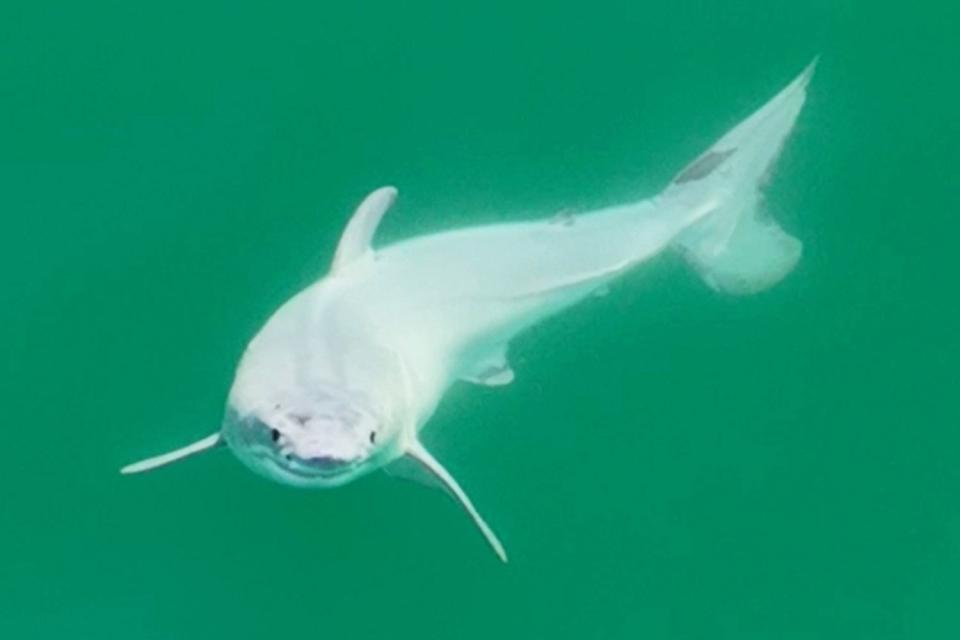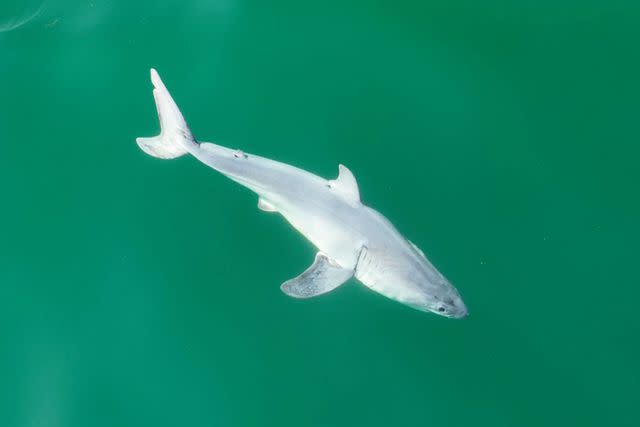Great White Shark Photographed Off California Coast Could Be 'Youngest Ever Recorded Alive'
A sighting in July 2023 by a wildlife photographer and a biology doctoral candidate could be the first of its kind

For possibly the first time ever, a great white shark may have been spotted just after birth.
On July 9, 2023, wildlife filmmaker Carlos Gauna and University of California Riverside doctoral student Phillip Sterne were capturing aerial videos and photos off the coast of Carpinteria, California, when they captured what Gauna called “a peculiar looking white shark.”
“This small shark was literally white all over,” Guana wrote of the sighting in an Instagram post published on Monday.
The area where they spotted the newborn shark “wasn’t technically” in a shark nursery, Guana continued, but “a local aggregation of very large seemingly pregnant white sharks” had gathered in the area over the last three years.
He noted, “I use the word ‘seemingly’ because the only way to confirm this, is by a means I don’t have access to. But based on the countless hours of observations I’ve made of sharks of all sizes, including pregnant ones, I deduced that some of these sharks were indeed pregnant.”
Related: Experts from Minorities in Shark Sciences Share Their Most Shocking Shark Facts
On July 9, “One such large shark was visible. It disappeared just beyond the visual depths following some erratic yet unexpected movements. Shortly thereafter, this small, completely white covered white shark appeared,” he continued in the caption. “It was unlike anything I’ve seen before.”
In his and Sterne’s scientific article, which was published Monday in the Environmental Biology of Fishes, the two propose “two hypotheses” to explain the white covering on the shark that “appeared.” One such hypothesis is that “it is in fact a newborn white shark.”
“The key is in the shape and size of the fins. Specifically the dorsal fin. It’s unmistakable that this is a very young white shark. The problem is, nobody has ever seen one so young before and this could very well be the youngest ever recorded alive,” Guana wrote.
Never miss a story — sign up for PEOPLE's free daily newsletter to stay up-to-date on the best of what PEOPLE has to offer, from celebrity news to compelling human interest stories.
“Notice the white substance. In our paper, we suggest this is a white uterine milk lining that has coated the shark. In the extended footage, the shark is visibly turning darker and shedding the layer,” he continued, elaborating on his and Sterne’s hypothesis that the shark was a newborn.
Their other hypothesis, Guana noted, is that it was “a shark with a skin condition.” He added, “More work and observations will be needed, as the sample size of this observation is only one.”
Related: Brave Good Samaritans Save Large Shark Stranded on Florida Beach in Dramatic Rescue —Watch!

The shark that the pair spotted was 5 feet in length, and marks a “very exciting observation,” Massachusetts Division of Marine Fisheries scientist Greg Skomal told CNN.
“It has been hypothesized by other researchers that white sharks are born in shallow, coastal waters in this region, but never observed,” he said, adding: “While the presence of this young white shark in this area supports this hypothesis, the actual birth was not observed. We cannot rule out that the shark, which is quite mobile, could have moved a great distance from the birthing area.”
Additionally, National Geographic explorer Gibbs Kuguru said that the sighting is “a game-changer”—especially if the initial hypothesis is correct.
“The fact that we have a shark in the process of shedding its 'amniotic fluid' is compelling evidence that we're looking at a newborn, which is critical because it strongly suggests the shark hasn’t strayed far from its birth site,” he told the magazine. “Also, considering the decades of research about finding the elusive mating and birthing locations of great whites, stumbling upon a potential pupping ground like this is nothing short of radical.”
For more People news, make sure to sign up for our newsletter!
Read the original article on People.

